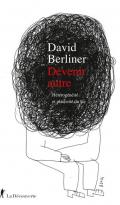To imagine oneself as a goat, to take oneself for Napoleon or for Wonder Woman, to hide behind a mask, a vector of power… The contemporary imagination harbors multiple role-playing games aimed at evading identity assignments. Becoming other: the idea of escaping oneself (one’s face, one’s flesh, one’s language) has crossed us probably since childhood. If only to thwart what the writer Julien Green calls “the ingenious ordeal of identity”. In the preface to his novel If I Were You (1947), he wrote: “Part of our sadness comes from the fact that we are perpetually the same, that each morning we wake up with the same problem to solve, which is how to bear ourselves until evening, and until death. If this fatigue of being oneself and the way in which humans deal with plasticity have been widely analyzed in the history of thought, the originality of the text of the Belgian anthropologist David Berliner consists in anchoring this “exo-experience at the heart of our present time. Where contrary discourses and aspirations assert themselves at will: those who promote the existence of homogeneous and stable identities face those who defend the fluidity, the plasticity and the multiplicity of the faces of the self. Without denying the weight of those who claim a single and solid self, Berliner hypothesizes that the self is always “more fragmented and malleable than one might think”, that it is “alterable by experience” and that, in fact, the spirit of the times, tired, sad and monotonous, pushes this elasticity more than ever. Deploying an “anthropology of experience” based on the observation of individuals immersed in their immersive rites, the author documents the need of many of our contemporaries to invest a reality different from their own, by switching to a favorable framework to a doubling, to a demultiplication. From the phenomenon of “cosplay” to “animal becomings” (connecting with an animal or mythological self), from the imitation of a model, in whose skin one slips, to the practices of “escapism” (these fictional immersions intended to escape the circumstances of our existence), he records the rise of these experiences by which “an individual identifies himself with an entity, whether human or not”. Practices which give reason to William James when he evoked the “fragmentation of the personality into different selves which can belie each other”. Often, by becoming other, these tinkerers of identity find themselves, because a repair – a “healing by metamorphosis”, to quote the historian of ideas Jean Starobinski – is played out in the test of plasticity. To become other, according to David Berliner, “is to evade the rules of one world to switch to another: a universe of creative potentialities, connections, causalities, sensations and different emotions”. By this gap with the uses of the self, even if it means assuming unavowable desires, this large family of mischievous players defends a “policy of multiplicity and plasticity”, which, behind its apparent lightness, disturbs the reassuring model of a rhetoric authenticist and reminds us, by its very antics, that concern for oneself is never anything but concern for the other in oneself.
We wish to say thanks to the author of this post for this amazing material
To think is to say no? | Philosophy magazine n°160
Visit our social media profiles and other pages related to themhttps://nimblespirit.com/related-pages/

